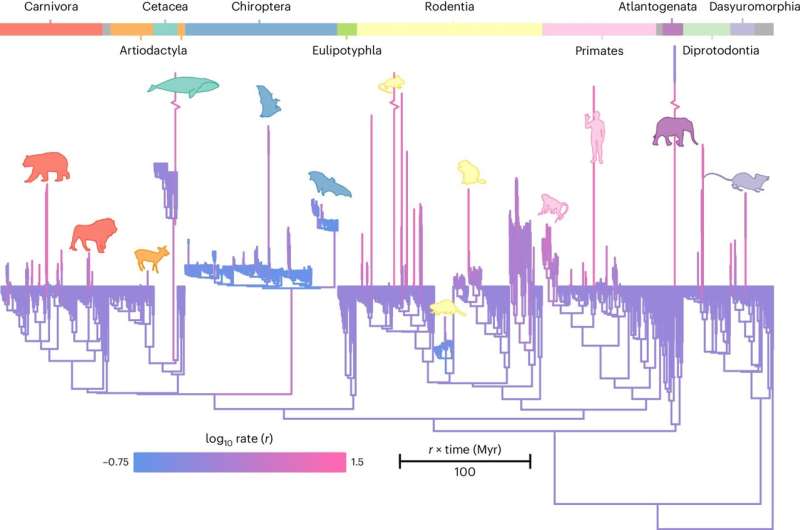This article has been reviewed according to Science X's editorial process and policies. Editors have highlighted the following attributes while ensuring the content's credibility:
fact-checked
peer-reviewed publication
trusted source
proofread
Brain size riddle solved as humans exceed evolutionary trend

The largest animals do not have proportionally bigger brains—with humans bucking this trend—a study published in Nature Ecology & Evolution has revealed.
Researchers at the University of Reading and Durham University collected an enormous dataset of brain and body sizes from around 1,500 species to clarify centuries of controversy surrounding brain size evolution.
Bigger brains relative to body size are linked to intelligence, sociality, and behavioral complexity—with humans having evolved exceptionally large brains. The new research reveals the largest animals do not have proportionally bigger brains, challenging long-held beliefs about brain evolution.
Professor Chris Venditti, lead author of the study from the University of Reading, said, "For more than a century, scientists have assumed that this relationship was linear—meaning that brain size gets proportionally bigger, the larger an animal is. We now know this is not true. The relationship between brain and body size is a curve, essentially meaning very large animals have smaller brains than expected."
Professor Rob Barton, co-author of the study from Durham University, said, "Our results help resolve the puzzling complexity in the brain-body mass relationship. Our model has a simplicity that means previously elaborate explanations are no longer necessary—relative brain size can be studied using a single underlying model."
Beyond the ordinary
The research reveals a simple association between brain and body size across all mammals which allowed the researchers to identify the rule-breakers—species which challenge the norm.
Among these outliers includes our own species, Homo sapiens, which has evolved more than 20 times faster than all other mammal species, resulting in the massive brains that characterize humanity today. But humans are not the only species to buck this trend.
All groups of mammals demonstrated rapid bursts of change—both towards smaller and larger brain sizes. For example, bats very rapidly reduced their brain size when they first arose, but then showed very slow rates of change in relative brain size, suggesting there may be evolutionary constraints related to the demands of flight.
There are three groups of animals that showed the most pronounced rapid change in brain size: primates, rodents, and carnivores. In these three groups, there is a tendency for relative brain size to increase in time (the "Marsh-Lartet rule"). This is not a trend universal across all mammals, as previously believed.
Dr. Joanna Baker, co-author of the study also from the University of Reading, said, "Our results reveal a mystery. In the largest animals, there is something preventing brains from getting too big. Whether this is because big brains beyond a certain size are simply too costly to maintain remains to be seen. But as we also observe similar curvature in birds, the pattern seems to be a general phenomenon—what causes this 'curious ceiling' applies to animals with very different biology."
More information: Chris Venditti et al, Co-evolutionary dynamics of mammalian brain and body size, Nature Ecology & Evolution (2024). DOI: 10.1038/s41559-024-02451-3
Journal information: Nature Ecology & Evolution
Provided by University of Reading



















